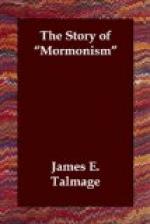But in a suburban corner, he came across the smoldering embers of a barbecue fire, with fragments of flesh and other remnants of a feast. Hereabout houses had been demolished; and there beyond, around the great temple that had first attracted his attention from the Iowa shore, armed men were bivouacked. This worthy representative of our country’s service was challenged by the drunken crowd, and made to give an account of himself, and to answer for having crossed the river without a permit from the head of the band. Finding that he was a stranger, they related to him in fiendish glee their recent exploits of pillage, rapine, and murder. They conducted him through the temple; everywhere were marks of their brutish acts; its altars of prayer were broken; the baptismal font had been so “diligently desecrated as to render the apartment in which it was contained too noisome to abide in.” There in the steeple close by the “scar of divine wrath” left by a recent thunderbolt, were broken covers of liquor and drinking vessels.
Sickened with the sight, disgusted with this spectacle of outrage, the colonel recrossed the river at nightfall, beating upward, for the wind had freshened. Attracted by a faint light near the bank, he approached the spot, there to find a few haggard faces surrounding one who seemed to be in the last stages of fever. The sufferer was partially protected by something like a tent made from a couple of bed sheets; and amid such environment, the spirit was pluming itself for flight. Making his way through this camp of misery, he heard the sobbings of children hungry and sick; there were men and women dying from wounds or disease, without a semblance of shelter or other physical comfort; wives in the pangs of maternity, ushering into the world innocent babes doomed to be motherless from their birth. And at intervals, to the ears of those outcasts, the sick and the dying, the wind brought the soul-piercing sounds of the reveling mob in the distant city, the scrap of vulgar song, the shocking oath, shrieked from the temple tower in the madness of drunken orgies.
This, however, was but the rear remnant of the’ expatriated Christian band. The van was already far on its way toward the inviting wilderness of the all but unknown west. But the wanderers were not wholly without friends; certain Indian tribes, the Omahas and the Potawatomis, welcomed them to their lands, inviting them to camp within their territory during the coming winter. “Welcome,” said these children of the forest, “we too have been driven from our pleasant homes east of the great river, to these damp and unhealthful bottoms; you now, white men, have been driven forth to the prairies; we are fellow-sufferers. Welcome, brothers.”




